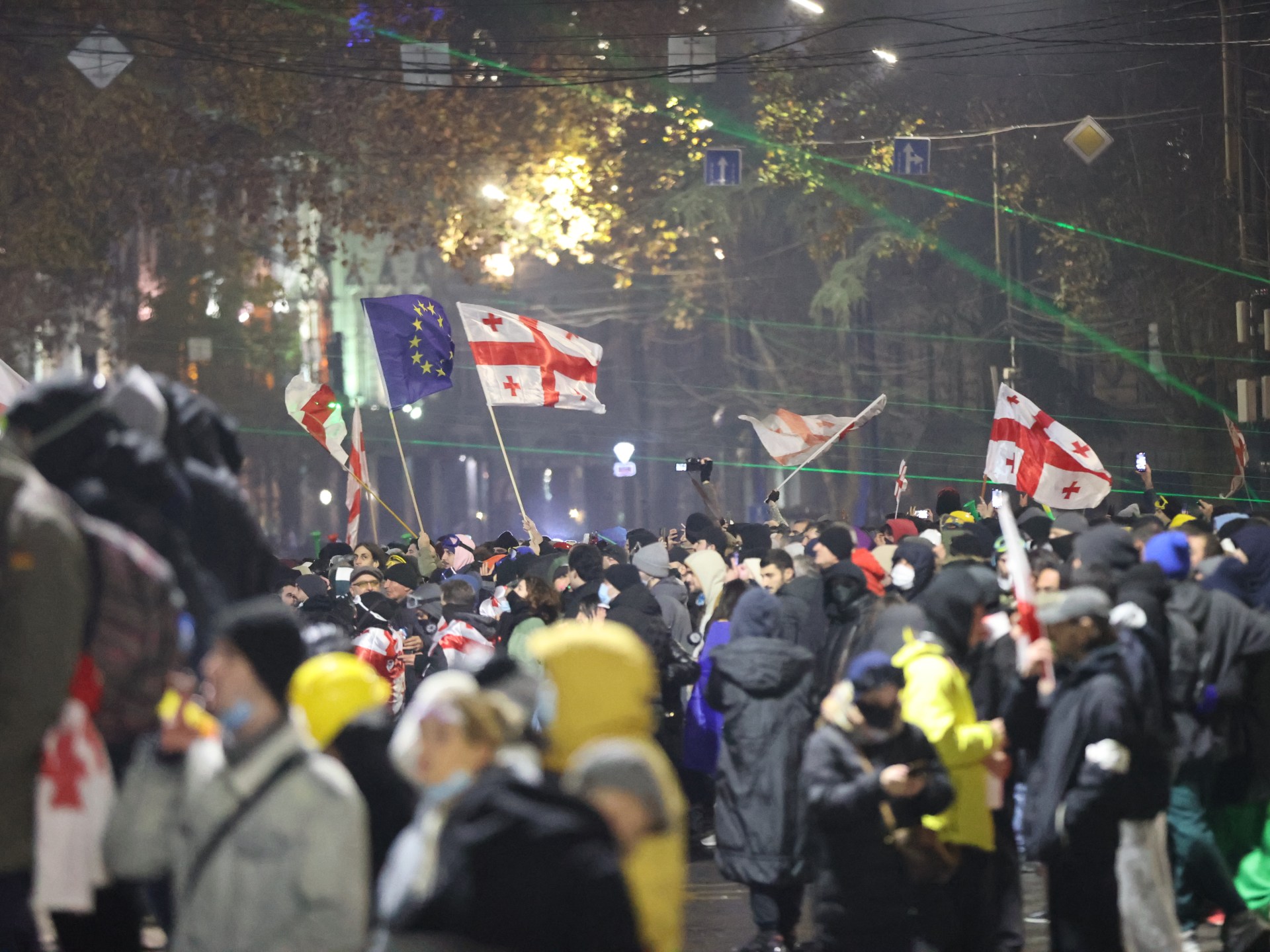Antigovernment protests in Georgia have continued for over two weeks now, with no end in sight. On November 28, Prime Minister Irakli Kobakhidze announced he was putting on hold accession negotiations with the European Union for four years, sparking public outrage.
Flying the star-studded EU flag, protesters have been pushing against the governing Georgian Dream’s (GD) party, defying water cannon, tear gas and police brutality. The rallies have drawn support from Georgia’s President Salome Zourabichvili and prompted countries like Lithuania to call for EU sanctions against Kobakhidze, GD’s founder Bidzina Ivanishvili and other top figures in Tbilisi.
While the demonstrations show no sign of subsiding, it seems unlikely the GD would reverse course. On the contrary, the government has doubled down, with more than 400 people arrested and reports of beatings and harassment piling up.
Georgia’s decision to shun the EU is consequential not only for the country’s accession prospects, but also for the eastward enlargement process of the union as a whole.
The Georgian government has come to the conclusion that the status quo suits it. Georgia already has privileged economic access to the EU, including visa-free travel.
Trying harder to actually join the Union could cost it dearly. For one, conducting the reforms required by the EU would make it more difficult – though not impossible – to manipulate elections and pass repressive legislation, such as the foreign agents law inspired by Russian legislation.
Accelerating accession talks could also trigger punishment by Russia which has multiple levers in Georgia and surely keeps tabs on billionaire Ivanishvili who made his fortunes in Moscow. That is why GD has been hedging between the EU and Russia.
Now, faced with harsh criticism by the European Parliament, Tbilisi has given Brussels the cold shoulder and has insisted that it will restart accession talks “but only with dignity and justice and without blackmail”, as Kobakhidze put it on December 4.
Of course, there is the danger the EU could strike back with economic sanctions. Yet Ivanishvili, Kobakhidze and the rest are probably counting on their allies, such as Hungary’s Viktor Orban, to block such moves. And who knows? Incoming US President Donald Trump could become a partner for Tbilisi, too, scrapping the current administration’s policy on democracy and human rights.
The problem is that Georgia could well set a precedent for other candidate countries. The semi-detached status it has now established – where it enjoys certain privileges without making the painful reforms the EU requires – is what others desire, as well.
The EU’s focus on the rule of law does not sit well with elites in a number of candidate countries. Just like GD, there are other political actors that prefer to pay lip service to European integration while entrenching themselves in power and engaging in state capture.
Serbia is one example. The Serbian government is negotiating EU membership but not rushing to meet the EU’s demands, notably on sanctioning Russia or resolving the dispute with Kosovo. Its governance model also falls well short of fulfilling the democratic requirements of the EU.
North Macedonia is likewise stuck, refusing to honour a commitment to the EU on amending its constitution and thus granting a concession to neighbouring Bulgaria. Moldova could also slow down its accession bid, if the pro-EU forces lose next year’s parliamentary elections.
But Georgia’s precedent is not the only factor that could undermine EU enlargement to the east. The process was already burdened by major obstacles even before the Georgian government made its decision to freeze talks.
One of the main hurdles has been geopolitics. Russia’s full-scale invasion of Ukraine gave enlargement a tremendous boost, with EU member states agreeing to open accession talks with Kyiv and Chisinau. In the Western Balkans, Bosnia jumped on the bandwagon, too. However, so long as there is no lasting settlement in Ukraine, the issue of EU membership remains secondary. The conversation about NATO and security guarantees is much more urgent, for obvious reasons.
In Moldova, Russia has ample opportunities to play a spoiler in domestic politics using money and disinformation and playing on fears that the war could spill over. Next year’s general elections may actually see Moscow-friendly forces coming on top and thwarting the pro-EU agenda.
Another obstacle is the EU itself. The tenor of the current conversation within the 27-strong bloc is that it needs to reform its institutions before it opens the door again. But revisiting issues, such as how many commissioners there should be or whether EU Council could take decisions on foreign affairs by qualified majority rather than unanimously, could open a can of worms.
It is questionable whether the Union and its constituent parts have the bandwidth to deal with internal overhaul, on top of all the other headaches they are handling at present. But absent reform, enlargement is held hostage by individual EU members who can veto and block collective decisions. Competition by Ukrainian farmers or concerns about populists at home could well turn even pro-expansion countries like Poland, which will hold the EU Council’s presidency in the first half of 2025, into staunch detractors.
If there is anything positive that has come out of recent developments in Georgia, it is that there is clear evidence of the EU’s lasting appeal among ordinary citizens in Eastern Europe.
The prospect of Georgia abandoning its EU bid has produced massive social mobilisation that has dwarfed previous protest waves, including the one in the immediate aftermath of the contested election on October 26.
In Moldova, there are positive signs, as well. Earlier in November, Moldovans re-elected their pro-EU President Maia Sandu for a new term. In a referendum held in parallel with the first round of the presidential race, they also narrowly approved an amendment inserting the goal of joining the EU in the country’s constitution.
Enlargement is, therefore, not dead. It is simply postponed yet again.
The views expressed in this article are the author’s own and do not necessarily reflect Al Jazeera’s editorial stance.
